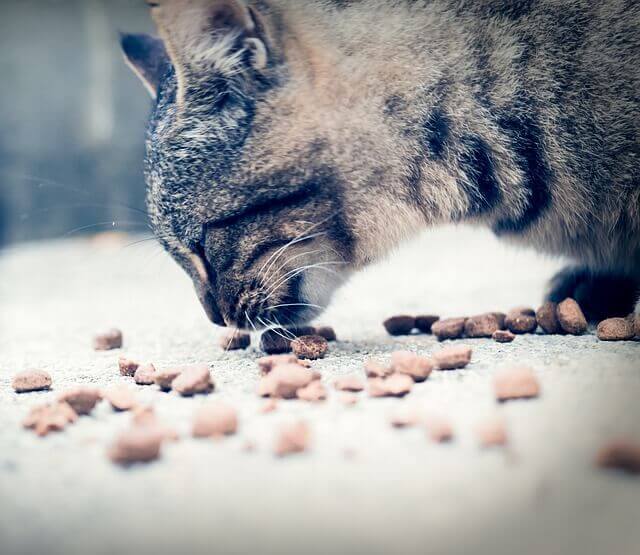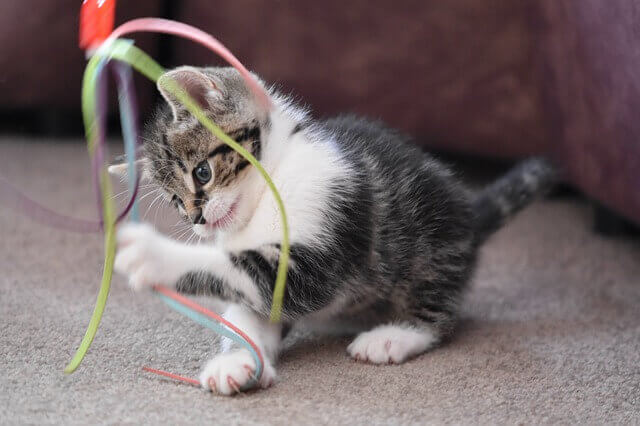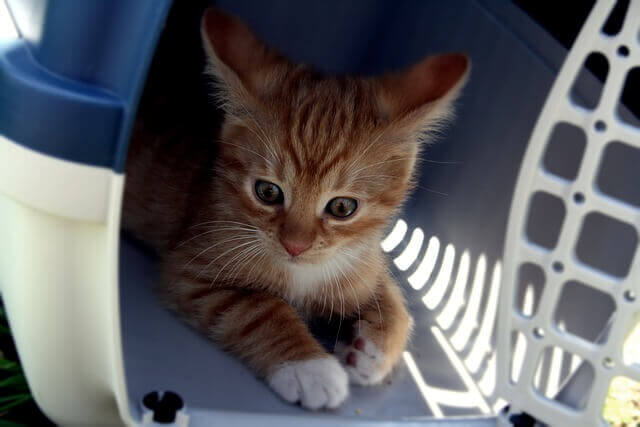We are so excited for your new little family member! We know there is so much to learn when bringing home a kitten and you may have some questions. We are here to help! This page will provide you with many resources about giving your kitten the best care.
Nutrition
 Nutrition is very important for cats of all ages and there is always a lot of discussion on what type of food to feed your kitten. Our nutritionist on staff recommends doing a mixed diet of dry kibble and wet food. Each one has many different benefits that can keep them overall healthy when used together. Often times, the best recommendations are to do a 50/50 of each or 75% wet food to 25% dry food. Dry kibbles can help with dental health by brushing off some of the plaque as well as has great satiety, however, a 100% dry kibble diet can cause your cat to become obese in time. Wet food contains a great moisture content which is very helpful if your kitten does not tend to drink very much. This can help them with their kidney and urinary functions. Another great resource to have in your home to help with your kitten's water intake is a drinking fountain, and no not the one you are thinking of. A feline drinking fountain! The movement of the water is very attractive to cats and can entice them to drink more water which is highly important for their health.
Nutrition is very important for cats of all ages and there is always a lot of discussion on what type of food to feed your kitten. Our nutritionist on staff recommends doing a mixed diet of dry kibble and wet food. Each one has many different benefits that can keep them overall healthy when used together. Often times, the best recommendations are to do a 50/50 of each or 75% wet food to 25% dry food. Dry kibbles can help with dental health by brushing off some of the plaque as well as has great satiety, however, a 100% dry kibble diet can cause your cat to become obese in time. Wet food contains a great moisture content which is very helpful if your kitten does not tend to drink very much. This can help them with their kidney and urinary functions. Another great resource to have in your home to help with your kitten's water intake is a drinking fountain, and no not the one you are thinking of. A feline drinking fountain! The movement of the water is very attractive to cats and can entice them to drink more water which is highly important for their health.
One other thing that is helpful to have for your kitten are mice cat feeders, such as those created by the company Doc and Phoebe! It’s a natural way to feed your cat by allowing them to keep their mind and body active by hunting the mice feeders. This can also help keep your cat from gaining weight quickly as they aren’t overeating or lessening activity. We think this is a very creative and healthy way to keep your cats nutrition at it’s best!
Socialization
 Socialization is an extremely important factor to set up your kitten’s life as a pet, patient, and being able to interact well with other animals. It’s easy to think that a cat doesn’t socialize like dogs, however different socialization activities can help your kitten be a sweet member of the family such as meeting new people or being able to play with children and adults alike. Exposing your kitten to all these different social scenarios will make them comfortable in any situation they may be faced with regularly!
Socialization is an extremely important factor to set up your kitten’s life as a pet, patient, and being able to interact well with other animals. It’s easy to think that a cat doesn’t socialize like dogs, however different socialization activities can help your kitten be a sweet member of the family such as meeting new people or being able to play with children and adults alike. Exposing your kitten to all these different social scenarios will make them comfortable in any situation they may be faced with regularly!
Vaccines
Kitten Vaccine Schedule:
- 8 weeks of age: FVRCP 1/3, FELV 1/2 12 weeks of age: FVRCP 2/3, FELV 2/2
- 16 weeks of age: FVRCP 3/3, Rabies
- After 16 weeks or fully vaccinated: Spay/Neuter
Vaccines and Preventative:
- Rabies Vaccination: This vaccine is required by law, also required by law to be performed by a DVM. We only offer the 1-year vaccine at this time because 3 years vaccines were reported to cause vaccine reactions. We will however accept the history of a 2 or 3 year given elsewhere. Rabies is also required to be up to date to perform any services in an animal care facility unless noted by a doctor otherwise. If rabies is not up to date, be sure to inform the owner and schedule them for a Wellness Exam to be updated by a doctor.
- Feline Distemper Vaccination: Also known as FVRCP, this protects cats against Feline Rhinotracheitis, calicivirus, panleukopenia, and Chlamydia which are all diseases that a cat could be exposed to without actually coming into contact with an infected cat. Both indoor and outdoor cats receive this as a core vaccine because of how contagious these diseases are. After the kitten boosters ending at one year, it can then become a 3-year vaccine.
- Feline Leukemia Vaccination: Also known as FeLV. This vaccine is given annually to help prevent against Feline Leukemia in which cats can get by other infected cats. This vaccine is given to outdoor cats who venture out without owner supervision to where they may even eat or drink from a shared bowl. New studies recommend that kittens are given this initially and may become optional afterward because sometimes when a kitten grows, the owner may change their mind on letting them outside.
FeLV/FIV Testing: Every cat with an unknown history should be tested to ensure they are not infected by FeLV (Feline Leukemia) or FIV (Feline AIDS). It is very important to have your kitten tested to make sure they don’t have these diseases and if they do to try and treat as much as possible.
Desensitizing to the Cat Carrier
 Oftentimes, cat owners face the difficulty of getting their cat to the vet. They will bring out the cat carrier and the cat will resist getting in or hide altogether. There is a way to avoid this difficulty though! The idea is to desensitize your kitten and make the carrier not be such a scary thing. By keeping the carrier out in a common area for your kitten, it will become comfortable with it. Even keeping the door open for your kitten to go in and out as it pleases can help so much! This will set them up for success as they won't be associating the carrier with vet visits and will be more likely to go on in when it’s time to leave.
Oftentimes, cat owners face the difficulty of getting their cat to the vet. They will bring out the cat carrier and the cat will resist getting in or hide altogether. There is a way to avoid this difficulty though! The idea is to desensitize your kitten and make the carrier not be such a scary thing. By keeping the carrier out in a common area for your kitten, it will become comfortable with it. Even keeping the door open for your kitten to go in and out as it pleases can help so much! This will set them up for success as they won't be associating the carrier with vet visits and will be more likely to go on in when it’s time to leave.
